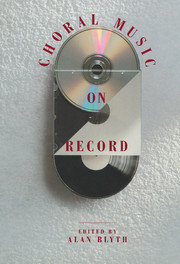Book contents
- Frontmatter
- Contents
- Preface
- Monteverdi: Vespers (1610)
- J.S. Bach: St John Passion
- J.S. Bach: St Matthew Passion
- J.S. Bach: Mass in B Minor
- Handel: Messiah
- Mozart: Requiem Mass
- Haydn: The Creation
- Haydn: The Seasons
- Beethoven: Missa Solemnis
- Mendelssohn: Elijah
- Rossini: Stabat mater Petite messe solennelle
- Berlioz: Grande Messe des Morts Te Deum L'Enfance du Christ
- Verdi: Requiem Mass
- Brahms: A German Requiem
- Fauré: Requiem
- Elgar: The Dream of Gerontius
- Walton: Belshazzar's Feast, Tippett: A Child of Our Time, Britten: War Requiem
- Stravinsky: The Wedding Symphony of Psalms
- Janáček: Glagolitic Mass
- Discographies
- Index
Beethoven: Missa Solemnis
Published online by Cambridge University Press: 02 December 2009
- Frontmatter
- Contents
- Preface
- Monteverdi: Vespers (1610)
- J.S. Bach: St John Passion
- J.S. Bach: St Matthew Passion
- J.S. Bach: Mass in B Minor
- Handel: Messiah
- Mozart: Requiem Mass
- Haydn: The Creation
- Haydn: The Seasons
- Beethoven: Missa Solemnis
- Mendelssohn: Elijah
- Rossini: Stabat mater Petite messe solennelle
- Berlioz: Grande Messe des Morts Te Deum L'Enfance du Christ
- Verdi: Requiem Mass
- Brahms: A German Requiem
- Fauré: Requiem
- Elgar: The Dream of Gerontius
- Walton: Belshazzar's Feast, Tippett: A Child of Our Time, Britten: War Requiem
- Stravinsky: The Wedding Symphony of Psalms
- Janáček: Glagolitic Mass
- Discographies
- Index
Summary
The Missa Solemnis is exceptional among great choral works in its dependency upon a great performance. Byrd's four-part Mass can be sung by anxious amateurs and still move its hearers. Mozart's Requiem is given every year by countless school choirs and choral societies and still manages to impress. Bach's Mass in B minor would sound like great music even if sung by a few sopranos and a bass gathered round the piano on an old-fashioned ‘musical evening’ at home. But the Missa Solemnis is different. It makes almost superhuman demands of its performers, and the best that they can give will not amount to much unless an outstanding conductor is there to control the massive forces, give them a vision and inspire them. Of the orchestra it demands unrelaxing attention to details of rhythm, accentuation and balance. The five soloists (four singers, one violinist) have immense opportunities, including (for the violinist) the equivalent of a concerto's slow movement, but the responsibilities are correspondingly awesome. For the soprano soloist in particular, Beethoven's demands upon high notes and breath-control are almost extortionate. The greatest challenge of all confronts the chorus. No choir can attempt the Missa Solemnis without a strong tenor line: that sets a formidable condition for a start. By the end of the evening all voices are likely to feel sung out. ‘One more page and I'd have died’ they say to each other when it is all over. Again the soprano part is cruellest. Beethoven thinks nothing of sending them up to the B flat, there to stay singing ‘Et vitam venturi’ till they begin to wonder whether the life to come may not be more imminent than previously supposed.
- Type
- Chapter
- Information
- Choral Music on Record , pp. 139 - 150Publisher: Cambridge University PressPrint publication year: 1991



